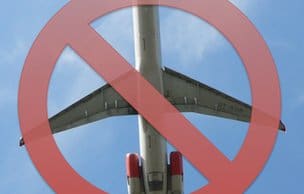On December 20, 2018, my wife and I watched an interview of fifteen year-old Greta Thunberg and her TED talk about the climate crisis. In the moments afterward, we realized that we could no longer justify flying.
The power of this young person’s voice is overwhelming. If you have not listened yet to Greta’s TED talk or her speech at the 2018 Climate Summit in Poland, we suggest you do. Greta’s way of communicating offers one of the most, if not the most, clear, compelling, and inspiring messages to all of us, especially we of the older generations, that we of the developed nations must start making sacrifices now to have any hope of enabling Greta’s generation to have a livable planet.
Grappling with how to respond to the climate crisis is an ongoing evolution, and we have taken some steps over the years, but it is rare that we make new big commitments. Committing to no more flying is a big one for us. But there was something special and super-compelling about Greta’s intensity, integrity, clarity, and consistency, and it affected us, and we are newly inspired to act.
One of the compelling things Greta says is that “what we do now, me and my generation can’t undo in the future.” She is right. Once airborne, although some carbon dioxide is continually absorbed in varying ways in the carbon cycle, much of it stays in the atmosphere for many decades to centuries. She says that “you are stealing our futures in front of our eyes” by continuing to emit carbon. The best option has always been and remains, not emitting carbon in the first place.
Greta also affirms that equity and climate justice are absolutely necessary to make action on climate work at the global scale, meaning that the developed countries must get down to zero emissions first so that poorer countries can build the infrastructure – roads (for EVs and bikes of course), schools, hospitals – that we already have. She says “today we use 100 million barrels of oil per day and there are no rules today to keep that oil in the ground, so we can’t save the world by playing by the rules and the rules have to change. Everything needs to change, and it has to start today.”
Regarding flying specifically, Greta puts it in black & white terms. If you fly, you are part of the problem, or you do the right thing and don’t fly. And she has convinced her once globe-trotting parents to swear off flying.
The commitment matters more if it is shared with others. Greta tweeted a recent study that found that leading by example by quitting flying has a huge impact. The bottom line? According to the study, 75% of people say if someone they know stays on the ground because of climate concerns it changes their view. Ergo, this blog.
Would a movement to reduce air travel matter? Ultimately I concluded that yes, it matters. When enough people make a similar commitment, to the point where a market force is applied, the global volume of air travel will be reduced. Reducing air traffic, which is currently expanding, would help significantly.
Knowing that I have a work trip to Denver in June 2019 from where I live in northern California, I quickly got onto Amtrak’s website to see what the possibilities are for train travel. We did have some experience with this since we took a cross-country trip by train in 2007 for a climate march in Washington DC. Train travel is not inexpensive, it takes a long time, and it is not carbon-free, but it is better than flying, and with enough planning, it appears to be workable. Given the fact that one can do some work on a train, taking the extra time for travel may not be a big problem. I recognize that that won’t necessarily work for everyone. We all have our own circumstances and limitations, so the point is, it can work if you put some careful planning into it.
But here is another point for all who care: All forms of powered travel have some emission, so the important question to ask if one really wants to reduce their footprint is: do I really need to take this trip?
Then there are emergencies. If faced with a life and death emergency, we would consider flying. But that is the only exception to our new self-imposed rule.
Here are some things to think about that can help reduce your travel emissions.
- Consider not traveling. Every time you think about traveling by air, think: “Do I really need to?”
- Consider all the alternatives, if you must travel. A 2008 Union of Concerned Scientists “Getting There Greener” guide offers some ideas.
- Cancel the frequent flier program. Get rid of the things that would incentivize you to fly. Cancel any credit cards that give flier miles as rewards; switch to other forms of rewards.
- Offset your carbon.
I’ll end with a couple of quotes from Greta. Greta says that we already possess what we need to solve the climate crisis, “we have all the facts, and we have the solutions, all we have to do is wake up and change.” She says “instead of looking for hope, look for action. Then, and only then, hope will come.” OK Greta, heard you, we are acting!


